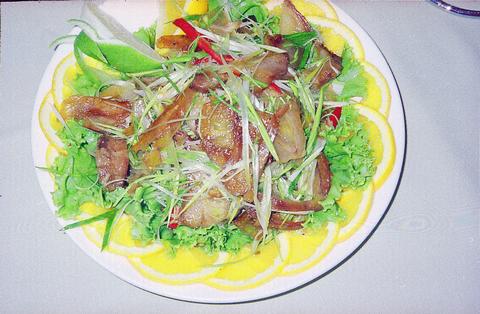From its decor, Paolo's looks like a typical Western-style pub, but it serves Chinese cuisine, albeit with several Western-influenced twists. It is run and owned by Paul Hsu (許經方), the same owner of the well-known Italian restaurant L'amico (意樂義大利餐廳).
Having run L'amico for more than 20 years, Hsu said his customers sometimes need to change their tastes. With this in mind, he opened this restaurant with a similar-sounding name to his own.

PHOTO: YU SEN-LUN, TAIPEI TIMES
The house's decor tends heavily toward blue, with tables and chairs surrounded by the occasional tropical plant and there is a shiny bar that reminds diners that you can always have beer or wine to go with your Chinese cuisine.
The dishes are a fusion of two major Chinese cooking styles, Shanghai and Sichuan. Recommended dishes include the fresh chicken in shao-hsing wine (醉雞) and cold beef brisket with fresh leeks (蒜苗牛筋). The fresh chicken dish is a typical Shanghai specialty, but at Paolo's, it comes boneless to cater to foreigners' tastes. The meat is juicy and tender with a strong flavor of shao-hsing wine. The beef brisket is a cold, spicy dish with the crisp flavor of fresh leeks, lemon and orange.
"Sichuan dishes go very well with cold white wine," Hsu said. "After a bite of hot and spicy meat or vegetables, and then a sip of cold white wine, you'll feel very refreshed."
The best dishes to wash down with white wine are Sichuan-style deep fried chicken wings (宮保雞翅), stir-fried beef with marinated cabbage (甕香泡菜爆炒牛肉) and kung-pao processed eggs (宮保皮蛋).
Paolo's proves that a fusion of foods and styles does not have to come at the expense of the food's quality. Hsu is a self-described glutton and a lover of good wine and cigars, which the house also sells. Apart from Paolo's and L'amico, Hsu also owns the Italian cafe Davinci and an antique shop called Sui Shih Chien (水石間).
On the third floor of Paolo's is a VIP area with antique tables and chairs in a candle-lit setting and a lounge area suitable for a small-sized party of up to 10 people.

One of the biggest sore spots in Taiwan’s historical friendship with the US came in 1979 when US president Jimmy Carter broke off formal diplomatic relations with Taiwan’s Republic of China (ROC) government so that the US could establish relations with the People’s Republic of China (PRC). Taiwan’s derecognition came purely at China’s insistence, and the US took the deal. Retired American diplomat John Tkacik, who for almost decade surrounding that schism, from 1974 to 1982, worked in embassies in Taipei and Beijing and at the Taiwan Desk in Washington DC, recently argued in the Taipei Times that “President Carter’s derecognition

This year will go down in the history books. Taiwan faces enormous turmoil and uncertainty in the coming months. Which political parties are in a good position to handle big changes? All of the main parties are beset with challenges. Taking stock, this column examined the Taiwan People’s Party (TPP) (“Huang Kuo-chang’s choking the life out of the TPP,” May 28, page 12), the Democratic Progressive Party (DPP) (“Challenges amid choppy waters for the DPP,” June 14, page 12) and the Chinese Nationalist Party (KMT) (“KMT struggles to seize opportunities as ‘interesting times’ loom,” June 20, page 11). Times like these can

June 23 to June 29 After capturing the walled city of Hsinchu on June 22, 1895, the Japanese hoped to quickly push south and seize control of Taiwan’s entire west coast — but their advance was stalled for more than a month. Not only did local Hakka fighters continue to cause them headaches, resistance forces even attempted to retake the city three times. “We had planned to occupy Anping (Tainan) and Takao (Kaohsiung) as soon as possible, but ever since we took Hsinchu, nearby bandits proclaiming to be ‘righteous people’ (義民) have been destroying train tracks and electrical cables, and gathering in villages

Dr. Y. Tony Yang, Associate Dean of Health Policy and Population Science at George Washington University, argued last week in a piece for the Taipei Times about former president Ma Ying-jeou (馬英九) leading a student delegation to the People’s Republic of China (PRC) that, “The real question is not whether Ma’s visit helps or hurts Taiwan — it is why Taiwan lacks a sophisticated, multi-track approach to one of the most complex geopolitical relationships in the world” (“Ma’s Visit, DPP’s Blind Spot,” June 18, page 8). Yang contends that the Democratic Progressive Party (DPP) has a blind spot: “By treating any